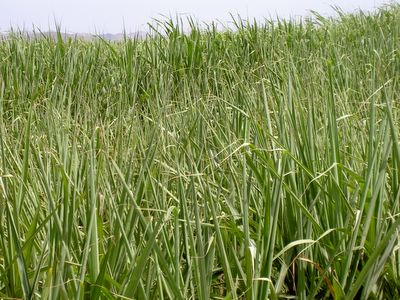
We visited the sugar cane fields owned and operated by Mickey's father. The visit was a family affair. They closed their restaurant, packed what I thought was a picnic lunch and off we went in the pickup. Two days before, we had had an unlucky urban encounter with the pickup. It was parked one block away from our hostal on a main street with plenty of people around. In the half hour it took us to gather our belongings, someone removed the left rear wheel and rolled off down the street with it. Tom stayed with the pickup, while Mickey and I went in search of a replacement. Tom said that in our absence, a man bicycled up to the car as if he were about to do something to it, but when he saw Tom, he turned around and went back in the direction he came from. In Cuenca, everybody with a car parked it in a garage, or behind a locked gate. This was another lesson in security for us: if you have a car, invest in and use wheel locks.
The work day in the fields had started by 6:00 a.m. As I understood it, they would go until 1:00 a.m. the next morning. Everybody was working hard when we arrived.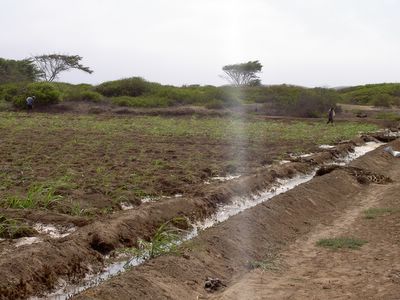
We came in down a long sandy series of unmarked, probably unnamed roads through the desert. It did not look like a promising location for a farm. But for the miracle of irrigation. In addition to the bags of fertilizer we were already carrying and ourselves, we picked up various pedestrians along the way. This is probably a hallmark of existence here - people helping each other out.
There was a small house on the property where the supervisor lived with his family. Mickey's father was the godfather of their son. As the day wore on, I thought about the lack of a support structure for parenting in a remote area such as this. Over the course of the day, I saw this 4 year old pick up two full-size axes and play with them in the sand - while his mother was watching. She also gave him a box of matches; he lit one and then lunged at his newfound playmate (Tom) with it. All under mother's watchful eye. She doesn't have a local library from which she could pick up a parenting book now and then. She doesn't have an opportunity to check with the other day-care Moms or child-care professionals at the end of the day. What support system does she have to improve her parenting skills?
In any event, she was kind to us. She let Mickey's mother use her kitchen to put together a wonderful hot meal - no picnic here!
There were lots of animals around the house - ducks, ducklings, guinea pigs, cows, pigs, dogs. At the end of the day, TM went for a short horseback ride.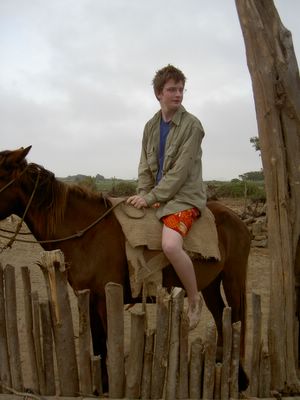
There were also some fruit trees and an avocado tree. On the other side of the irrigation ditch, there were sweet potatoes, corn, and beans growing. They definitely have the basics of what they need to eat well. But the primary action here was the sugar cane.
Sugar cane takes 18 months to establish and produce its first harvest. For a couple of years after that, there's a crop every 3 months. I didn't see anything in the way of farm equipment lying around, so I can only surmise that they use labor-intensive practices. Mickey's father took some time off the job to share some of his thoughts about the business of growing sugar cane.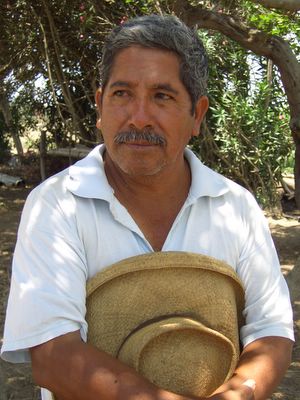
I was impressed that he uses biological pest controls. It was an easy choice, because they are inexpensive. He lived through the devastation caused by the 1983 El Niño, which wiped out his fields. Since then, he has lived in Lima and he has been an entrepreneur with six stores in the region, but he has by choice returned to farming. Generally people migrate from rural areas to urban ones. But, here is someone who returned to the land, knowing full well the trials and tribulations. During his first crop after he returned to farming, a dam upstream from there broke and remained broken for months. During that time, there was insufficient water for irrigation and he lost his newly planted fields.
We finished the day at the beach, body surfing in the wild waves. This is the third beach we have visited, since arriving in Northern Peru. At first, I didn't want to bother going, since most beaches pale in comparison to those in Sarasota. But unlike Sarasota, the surf all along this coast is great fun and I've been having a blast.
The farm is only a couple of miles from the beach. Mickey let both his younger brother and TM have a turn driving the pickup there and back. It was a manual transmission, so for TM, this also involved a driving lesson. TM was brimming with excitement at this opportunity. He was so excited that he shifted into gear just as I was hopping out of the bed onto the rear tire to get a close-up shot of a periguey (half goat/half sheep).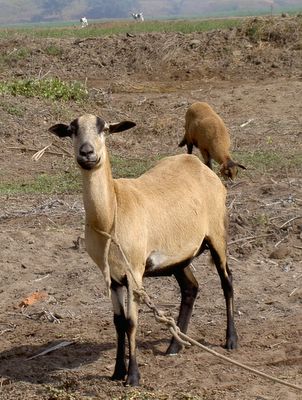
The road led to a very small, depressed-looking beach community. The beach itself was wide, soft, and unpopulated. Tom spent most of the time talking with Mickey's mother, while the rest of us bounced and floated around the crashing waves. Mickey's mother grew up in the area. When she was young, this used to be a fishing village. The fish were so plentiful, that locals could live off the fish they caught with casting nets - they didn't even need boats. Now there are almost no fish.
The people here don't know why. Perhaps there are commercial fishing operations that have wiped out local fish populations. Or maybe some critical corner of the marine ecosystem here was traumatized and is unable to heal itself. Or perhaps it's the result of the general die-off happening in all the world's oceans.
I know "life is unfair". We tell the kids this all the time. But, we're usually talking about the small stuff. Then there are the big ticket items. People here, with few resources and no security blanket to fall back on have to contend with El Niño phenomena wiping out roads and farms; with irrigation meltdowns; with entire fish populations disappearing. It is overwhelming to me and I am only a visitor.
For its part, the beach provided us a safe haven with its miles of open sand and sand cliffs. At first, we shared it with a large group of young men, who came to play soccer and play in the water. When they left, we had it all to ourselves.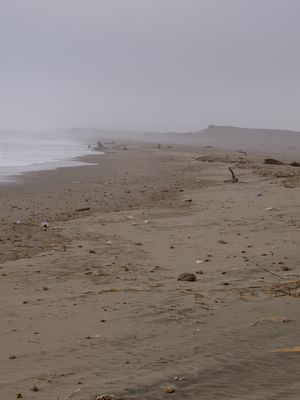
Back at the farm, we were treated to hot lemon-grass tea to warm up our water and wind cooled bodies. We have stayed in Chiclayo far longer than anticipated due to the friendship and generosity that Miguel and his family have shown us.

No comments:
Post a Comment